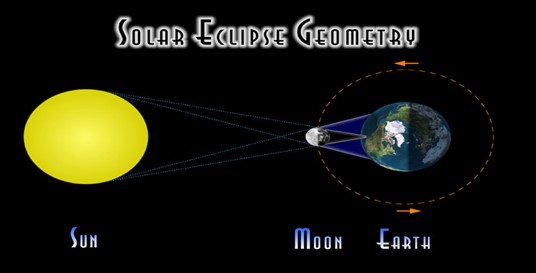By Zile Singh
On April 8, 2024, there will be a total solar eclipse. When the Moon comes in between the Sun and the Earth, it is called the solar eclipse. The lunar eclipse happens when the Earth passes in between the Sun and the Moon.
The next total solar eclipse will occur in 2044. The last total solar eclipse in North America was in August 2017. But, according to Fred Espenak, a former Astrophysicist from NASA, the seven-year difference between eclipses is “deceptive.” Previous to 2017, the total solar eclipse was one in 1979.
What is an eclipse? The dictionary meaning of an eclipse is blocking, covering, concealment, darkening, deteriorating, dimming, downturn, hiding, obscuring, occultation, overshadowing, shading, shrouding, slumping and surpassing.
Eclipses have inspired fear and awe among civilizations throughout history, from the Aztecs to the ancient Hindus. They are also associated with some major religious events, including the darkness that followed Jesus’ crucifixion in Christianity and, in Islam, the passing of the Prophet Muhammad’s son, Ibrahim.
The word ‘eclipse’ comes from the Greek word ‘abandonment’. The ancient Greek mythology believed that eclipses were a sign of gods’ anger with humans and that the Sun would abandon Earth, bringing untold misery. According to Norse mythology, the Vikings of northern Europe believed that during a total solar eclipse, the Sun was being eaten by two wolves known as Skoll and Hati.
Hinduism interprets Solar eclipses through the lens of mythical narratives and cosmological symbolism. The Puranas, ancient scriptures, narrate the tale of Rahu and Ketu, two shadow planets responsible for the solar eclipse. Rahu, the severed head of a demon, swallows the Sun causing the eclipse and Ketu, the body, is the end of the eclipse. This cosmic drama metaphorically suggests the perpetual struggle between light and darkness, good and bad, and knowledge and ignorance.
In astronomical terms, an eclipse occurs when an astronomical object is temporarily obscured by another astronomical body or having another body pass between it and the viewer. The obstruction can be partial or total. These objects, astronomical or celestial, are the Sun, the Moon, and the Earth. There are two types of eclipses.
“In Eclipse” is also an idiomatic term that means having lost significance, power, and prominence. In some modern spiritual traditions, solar eclipses are seen as opportunities for introspection, reflection, and transformation. They are often associated with themes of endings, beginnings, and rebirth. Some people believe that solar eclipses can bring about spiritual awakening and a heightened sense of awareness.
We deal with an ‘in eclipse’ situation many times in our life. We feel dejected, depressed and stagnant. If there is no movement of the celestial bodies mentioned above, there will be no eclipse, no day and night, and no change in weather.
Movement is essential for a change. That is why change is the law of nature. Stagnation is like death for a living being. One can see that out of every struggle and endeavor for change, there has come a new dawn, a rebirth of life and thought. “In Eclipse” situation is not permanent. This shall also pass.





